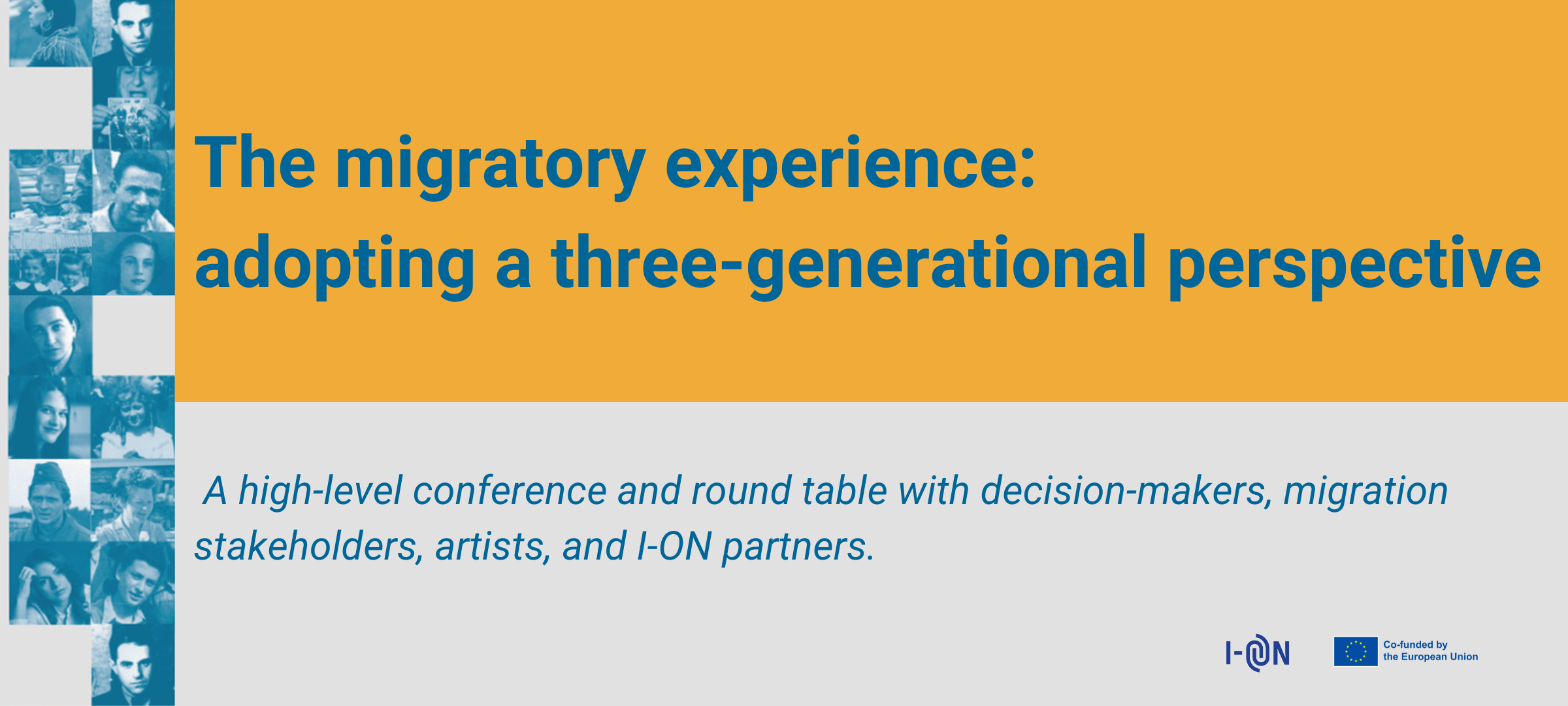
9.30 – 18.30
Wednesday, 26 April 2023
Norway House and European Parliament, Brussels
Europe is built on a diverse and vibrant mosaic of cultures, languages, and traditions. The motto of the European Union “United in Diversity” encapsulates its commitment to celebrating this diversity, while fostering a sense of shared identity and common purpose.
Yet, we live in a time where political forces combine pro-EU policies with critical stances towards immigration and social integration. A growing number of European governments point to multiculturalism as a negative phenomenon that leads to economic inequality, social fragmentation, and a loss of cultural identity.
Identity on the Line (I-ON) is a large-scale cooperation project, co-funded by the European Union, conducted by six cultural history museums and one university from seven European countries between 2019 and 2023. It aimed to explore the long-term consequences of traumatic experiences that follow war, forced migration, and the search for a new life and identity in a foreign land. And it studied how these experiences also shape the lives of the second and third generation of migrants.
The project findings are summarized in publications, a joint travel exhibition that has toured Europe, and now also as a series of recommendations for policymakers.
These recommendations aim to contribute to long-term solutions for an issue that is often seen as a short-term urgency. I-ON provides ideas for initiatives that are designed to foster societal cohesion and to avoid critical pitfalls on the way to more sustainable societies. In this regard, museums and academia can make a real difference in the communities they operate in – by providing a safe space where unheard voices can be heard, by facilitating a unique access to information on sensitive experiences, and by creating an arena for participation and intercultural dialogue. These are crucial components in the healing of collective trauma.
Invited speakers include:
Irena Joveva (video intervention), Member of the European Parliament
Magdalena Adamowicz, Member of the European Parliament
Walter Zampieri Head of Unit (Culture) European Education and Culture Executive Agency
Dr. Wiebke Sievers, Senior Researcher from the Austrian Academy of Sciences in Vienna
The discussion was moderated by:
Dr. Kathrin Pabst, I-ON Project Leader
We invite you to attend a high-level conference where relevant policymakers and stakeholders will discuss our project findings and recommendations.
You will also have the opportunity to hear directly from the leaders of the seven research projects conducted across Europe and attend a short documentary screening on the experience of Crimean Tatars in Ukraine.
Beż Nowoczesny Stowarzyszenie Prezentacja autorstwa Malwina Świtaj
“My new country did not want me… Years of complete uncertainty came for me, without any valid documents, health insurance, social or physical security. Grey years, years of struggle. Struggles for survival, struggles for identity.”
In many ways, these words act as an overarching expression for migrants worldwide. They are spoken by Dragan, a man who felt the impact of Slovenia’s independence in 1991 for years.
While factors and reasons for migrating vary across centuries, his story encapsulates the emotional experience migrants endure. Navigating the hardships of integration in a new culture and struggling to shape a new identity in a foreign environment are demanding processes which many migrants share. An international project took these processes to a new level by conducting interviews with the descendants of migrants such as Dragan, and found how much the following generations are affected as well.
Europe, both as a geographical continent and a cultural entity, is built on a diverse and vibrant mosaic of cultures, languages, and traditions. The motto of the European Union, “United in Diversity,” encapsulates its commitment to celebrating this diversity, while fostering a sense of shared identity and common purpose.
Yet, we live in a time where many political parties combine pro-EU policies with critical stances toward immigration and multiculturalism. A growing number of European governments point to multiculturalism as a negative phenomenon that leads to economic inequality, social fragmentation, and a loss of cultural identity.
In the last few decades, people have been fleeing to Europe in large numbers – many escaping conflict, terror, and persecution in their own countries. Since Russia’s military aggression in Ukraine in February 2022, Europe has received the largest number of people fleeing war since World War II.
This has put further pressure on the political discussions around migration, which increasingly rely on a ‘fortress Europe’ approach to close immigration opportunities and harden the EU’s external borders.
Identity on the Line (I-ON) is a large-scale cooperation project, co-funded by the European Union and conducted by six cultural history museums and one university from seven European countries.
It aims to explore the long-term consequences of migratory movements on the identity-building process of the people involved, and of their children and grandchildren. The project focused on collecting, analysing, and showcasing experiences from specific migratory processes that took place over the course of the last 100 years in Norway, Denmark, Sweden, Poland, Lithuania, Slovenia and Croatia.
The main findings are now summarized in a package of materials for educational and cultural institutions, as well as the general public, through physical and digital exhibitions, movies, publications, school packages – and now also a series of recommendations for policymakers.